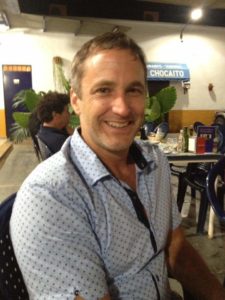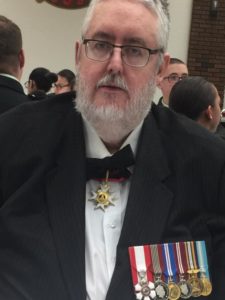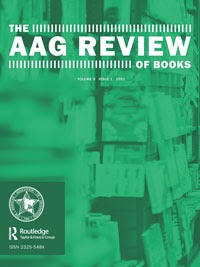AAG Announces Some 2022 AAG Award Recipients
2022 Susan Hardwick Excellence in Mentoring Award
The AAG bestows an annual award recognizing an individual geographer, group, or department, who demonstrates extraordinary leadership in building supportive academic and professional environments and in guiding the academic or professional growth of their students and junior colleagues. The late Susan Hardwick was the inaugural Excellence in Mentoring awardee. The Award was renamed in her honor and memory, soon after her passing.
 David Lopez-Carr, University of California Santa Barbara
David Lopez-Carr, University of California Santa Barbara
Dr. David Lopez-Carr has demonstrated outstanding leadership in creating effective, structured mentorship avenues. Specifically, his post-doc to tenure-track mentorship program is a shining example of how to undo structural inequalities.
Under his leadership as Chair of the UC Faculty Senate Affirmative Action, Diversity, and Equity Committee, the UC system increased the funding for the UC diversity post-doc program and launched a diversity faculty mentor program. The increased funding for the UC diversity post-doc has led to several additional post-doc positions each year. These post-docs are guaranteed a tenure track position at a UC campus and so through Lopez-Carr’s leadership, several new minority faculty are hired at UC campuses annually than would otherwise have been the case.
Lopez-Carr is a role model for promoting high standards for transparency and ethical integrity. He shares with his advisees a list of expectations of him and what he expects from them, uses this to start a discussion, and adapts his mentoring accordingly. He humbly recognizes no one person can serve all the roles of an advisor and encourages students and young faculty to seek support from faculty, professionals, family, and friends.
In addition, Lopez-Carr has published extensively with students and advisees, has excellent student allocation, and most of his students are female or from underrepresented groups and many are also first-generation university students. His students and mentees have incredible records of success. They have received over 70 total awards under Lopez-Carr’s guidance, including several Fulbright Fellowships, NSF Graduate Fellowships, NSF Dissertation Improvement Awards, and NASA Earth System Science Fellowships.
His approach and work could be replicated in other departments and institutions and demonstrates clear, intentional efforts to diversify the field.
For all these reasons, the AAG is pleased to recognize David Lopez-Carr with the 2022 Susan Hardwick Excellence in Mentoring Award.
2022 Diversity and Inclusion Award
The Diversity and Inclusion Award (previously Enhancing Diversity Award) honors those geographers who have pioneered efforts toward, or actively participate in efforts towards encouraging a more diverse discipline.
 Beverley Mullings, Queen’s University; Kate Parizeau, University of Guelph; and Linda Peake, York University
Beverley Mullings, Queen’s University; Kate Parizeau, University of Guelph; and Linda Peake, York University
Beverley Mullings, Kate Parizeau, and Linda Peake are Canadian-based academic geographers whose collaborative work has increased the visibility of the mental health crisis within AAG and the North American academy.
The AAG Diversity & Inclusion Committee was impressed by their translation of informal, kitchen-table conversations with graduate students into highly organized efforts that foreground this pressing topic in scholarly journals and professional meetings. This translation process began with the trio’s first academic talk on mental health in academia at the 2013 Feminist Geography Workshop at the University of Guelph. Since then, they have published widely on this topic in a variety of geographic journals and organized sessions at annual and regional meetings in the US and Canada.
Moreover, their efforts have resulted in the formation of the AAG Mental Health Task Force (2015-18) and an AAG Affinity Group on Mental Health in the Academy (2019). The committee recognizes the longstanding and continuing work of Dr. Mullings, Dr. Parizeau and Dr. Peake as contributing to ideals of justice, equity, and inclusion within geography.
The AAG is therefore pleased to recognize them with its 2022 Diversity & Inclusion Award.
 Austin Mardon, John Dossetor Health Ethics Centre
Austin Mardon, John Dossetor Health Ethics Centre
Austin Mardon is an adjunct assistant professor at John Dossetor Health Ethics Centre whose research and service advocates for individuals living with chronic mental disorders. Despite his diagnosis with schizophrenia during graduate school, he completed his PhD in geography and embarked on a multidisciplinary career that has spanned physical geography, planetary science, mental health, political history, and theology. He is a prolific researcher whose record includes over 70 books on these wide-ranging topics as well as journal articles featured in Nature and Science.
Aside from Dr. Mardon’s impactful scholarship, the AAG Diversity & Inclusion Committee was struck by the extent of his advocacy and mentorship. Speaking from a community member’s perspective, Dr. Mardon has provided sustained leadership to regional chapters of the Schizophrenia Society, the Premier’s Council on the Status of Persons with Disabilities, and the Alberta Mental Health Self-Help Network. More recently, Dr. Mardon has worked nationally to implement “Sharpen the Quill,” a program promoting student writing and literacy around COVID-19’s varied societal impacts. Carrying the flag of geography, Dr. Mardon’s sustained work by, for, and with the mental health and disability communities is a model for justice, diversity, and inclusion worthy of recognition.
The AAG is therefore pleased to recognize him with its 2022 Diversity & Inclusion Award.
2022 AAG Stanley Brunn Award for Creativity in Geography
The AAG Stanley Brunn Award for Creativity in Geography is given annually to an individual geographer or team of geographers that has demonstrated originality, creativity and significant intellectual breakthroughs in geography. The award includes a prize of $1,000.
 Kathryn Yusoff, Queen Mary University London
Kathryn Yusoff, Queen Mary University London
Professor Kathryn Yusoff is a self-described professor of “inhuman geography” in the School of Geography at Queen Mary University of London, after previous Lectureships at Lancaster University and the University of Exeter.
Yusoff is widely published in prominent journals of Geography as well as interdisciplinary journals of the humanities. Her research addresses political aesthetics, social theory, and questions of ‘Geologic Life’ within the proposed geologic epoch of the Anthropocene. Her 2019 book, A Billion Black Anthropocenes or None (University of Minnesota Press) examines the relationship between geology and subjectivity and seeks to recenter the question of race in the context of the Anthropocene.
Dr. Yusoff’s research draws from contemporary feminist philosophy, critical human geography as well as the earth sciences. She is particularly interested in the opportunities that the Anthropocene presents for rethinking the interactions between the earth sciences and human geography in the “geo-social formations” of Anthropogenic change.
Dr. Yusoff has been actively engaged in the arts as a Curator of “POLAR: the Art & Science of Climate Change,” a multi-disciplinary project about the curation and production of climate change knowledge in the polar regions; and “Weather Permitting,” a collaborative creative research group that investigates weather and climate change at the intersection of arts and sciences. She’s also made an appearance as “Time Traveller” in a film/installation by the Otolith Group, entitled INFINITY MINUS INFINITY, which draws on and is inspired by her theorization of the racial formation of geology.
For all these reasons, the AAG is pleased to recognize Professor Kathryn Yusoff as the recipient of the 2022 AAG Stanley Brunn Award for Creativity in Geography.
2022 AAG 2022 Harold M. Rose Award for Anti-Racism Research and Practice
The Rose Award was created to honor Harold M. Rose, who was a pioneer in conducting research on the condition faced by African Americans. The award honors geographers who have a demonstrated record of this type of research and active contributions to society, and is awarded to individuals who have served to advance the discipline through their research, and who have also had an impact on anti-racist practice.
 Caroline Faria, The University of Texas at Austin
Caroline Faria, The University of Texas at Austin
The AAG Harold M. Rose Award recognizes anti-racist scholarship and practice, drawing attention to the connections between research, social justice, and social change.
Dr. Caroline Faria stands out for her sustained engagement with debates in feminist geographies, Black geographies, and postcolonial geographies, which she has deeply entwined with her mentorship praxis and decolonial vision. Dr. Faria’s research program addresses a wide range of themes that attend to belonging in East Africa, feminist political ecologies, and embodied spatial knowledges. She makes key interventions in human geography through intersectional analyses of racial, gendered, and colonial power. Her research is paired with an ongoing commitment to unsettle normative methodologies by unveiling how power underpins knowledge production. In addition to her formidable single-authored work, she has co-authored with undergraduate students, graduate students, and faculty, demonstrating her dedication to cooperative scholarship and mentorship. This latter practice, mentorship through research collaboration and writing, is enhanced by her leadership in national and international organizing and leadership. The Feminist Geography Collective, which she formed in 2016, is an amazingly supportive research hub that provides a space for young women geographers and geographers of color to share ideas, develop research and teaching skills, present papers, produce alternative digital maps, and engage in activist scholarship. Further, Dr. Faria contributes extensively to diversity and racial justice initiatives at the university level, leading efforts to hire and support Black geographers at her home institution, the University of Texas at Austin. Her commitment to diversity and inclusion is also demonstrated by her community-building and formal mentoring work within the AAG and the International Geographical Union. The same commitment is demonstrated in her teaching and pedagogical practice, which have been recognized by three major awards at UT-Austin.
Harold M. Rose’s work is a reminder that scholars must go beyond theoretical understandings of racism to make a difference in actual communities. Dr. Faria’s stunning and seamless combination of research, mentorship, teaching, and community building carries the torch of Rose’s work. The AAG is pleased to celebrate Dr. Faria’s contribution to this tradition and to the real impacts she has made on her students, her colleagues and home institution, and on the broader interdisciplinary project of intersectional anti-racist feminist geographies.

